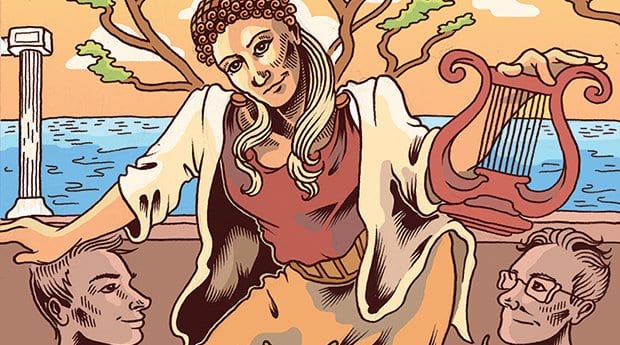I think it’s appropriate that the first lesbian I’m writing about for History Boys is the very first lesbian! Well, Sappho wasn’t actually the first lesbian — there are bound to have been others — but she’s the earliest one I can think of. And we eventually came to use the term “lesbian” to describe homosexual women because of Sappho, who wrote passionately about both men and women and lived on an island called Lesbos. Sappho is my first, but not my last; women’s history has been far too neglected.
Sappho was an ancient Greek who lived around 600 BCE. Most of what we know about her life comes from what we can glean from surviving bits of her poetry, of which we have mostly scraps, frequently just single lines. This raises the obvious question: can we treat lines of poetry as legitimate details about her biography?
This uncertainty, along with a goodly helping of homophobia, has resulted in a number of myths. People have said that Sappho was married to a rich man named Cercylas, from the island of Andros. Those who think this were probably taken in by Greek comic writers (who often wrote about Sappho), the chief evidence being that his name and origin translate roughly to “Dick Allcock from Man Island.” Another myth is that Sappho killed herself by jumping from a cliff on an island called Leukas because of unrequited love for a ferryman named Phaon.
In 2008, some people on Lesbos tried to ban the Lesbian and Gay Community of Greece (OLKE) from using the term “lesbian” to describe gay women, claiming it disgraces the inhabitants of the island (the “Lesbians”). The ban failed, but in the midst of the fuss there was an attempt to “straighten” Sappho out by trotting out the Phaon legend.
Nonetheless, there are some things we can say about her with a degree of certainty. She was probably born in the city of Mytilene, the capital of the Greek island of Lesbos in the Aegean Sea. If not born there, she lived there much or all of her life (which makes it not only a queer travel destination, but a pilgrimage for some). It was the “Archaic period” in Greece’s history and Rome wasn’t yet a major political power. Sappho was a lyric poet, meaning her poetry was quite emotional and could be set to music, probably the lyre. She was an aristocrat, had at least two brothers — Larichus and Charaxus — and a daughter named Cleis, which may have also been the name of her mother.
Sappho’s poetry is mainly about personal issues and her female-only thiasos. Thiasoi (the plural of thiasos) were religious societies or cults in ancient Greece (they were also significant in myth). She likely educated her thiasos in such disciplines as poetry, singing, dancing and possibly seduction and love. The group was also in some sense dedicated to Aphrodite, the Greek goddess of love, with Sappho as the intermediary. Sappho wrote passionately about some of the girls, but it’s unclear whether she was ever physically intimate with them. Regardless, scholars of some eras have preferred to bury any possibility of same-sex intimacy by casting Sappho in the role of a (presumably virginal) schoolmistress. Maybe it’s me, but making her a stern authority figure heading a school just seems kinky; I imagine glistening high-heeled boots and a yardstick for bottom-thwacking.
Beyond a complete ode to Aphrodite and a 2005 reconstruction of another poem, we have only strands of Sappho’s poetry, and scholars have made endless attempts to write in the missing bits. Whatever she may have been, I think it’s verses like the following interpretation, written to a girl, that have made her resonate through the ages:
How fair and good were the things we shared together,
How by my side you wove
many garlands of violets and
Sweet-smelling roses, and
made of all kinds of flowers
Delicate necklaces, how many
a flask of the finest myrrh
Such as a king might use
you poured on your body,
How then reclining you sipped
the sweet drinks of your choice.
(History Boys appears on Daily Xtra on the first and third Tuesday of every month. You can
also follow them on Facebook.)


 Why you can trust Xtra
Why you can trust Xtra


